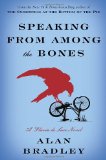
 Speaking From Among the Bones
Speaking From Among the BonesReview posted July 27, 2013.
Delacorte Press, New York, 2013. 378 pages.
Starred Review
Hooray! Another installment in the detective novels about Flavia de Luce, eleven-year-old genius and poison aficionado.
In this book, the locals are celebrating the quincentennial of the death of Saint Tancred by opening his tomb. Along the way, they find a dead body that is not five hundred years old, but rather that of their missing organist. Naturally, Flavia ends up gathering the clues to find the murderer.
I enjoyed this book immensely. There's another clever puzzle for Flavia to solve while bicycling around the neighborhood. This time, she and her sisters weren't nearly as mean to each other, and I enjoyed the respite. It looks like their beloved Buckshaw will have to be sold, which pulled them together. The book did end with a bombshell regarding their family, which stresses that these books should be read in order. Those who have read so far will be delighted as I with the latest installment.
Here are a few fun sections:
Ordinarily, anyone who made such a remark to my face would go to the top of my short list for strychnine. A few grains in the victim's lunch pail -- probably mixed with the mustard in his Spam sandwich, which would neatly hide both the taste and the texture . . .
It wasn't until I was nearly home -- not, in fact, until I was sweeping past the great stone griffins that guarded the Mulford Gates -- that I realized I had overlooked two very important things. The first was that business of the bat, and how it had managed to get into the church. The second was this: If the tomb in the crypt was occupied by the remains of Mr. Collicutt, where on earth, then, were the bones of Saint Tancred?
Whenever I'm a little blue I think about cyanide, whose color so perfectly reflects my mood. It is pleasant to think that the manioc plant, which grows in Brazil, contains enormous quantities of the stuff in its thirty-pound roots, all of which, unfortunately, is washed away before the residue is used to make our daily tapioca.
I knew that the instant life ends, the human body begins to consume itself in a most efficient manner. Our own bacteria transform us with remarkable swiftness into gas bags containing methane, carbon dioxide, hydrogen sulfide, and mercaptan, to name just a few. Although I had for some time been making notes toward a future work to be called De Luce on Decomposition, I had not had until that moment any real, so to speak, firsthand experience.
There you have it: An old-fashioned cozy mystery with a precocious and delightfully bloodthirsty sleuth in postwar England. Tremendous fun!
